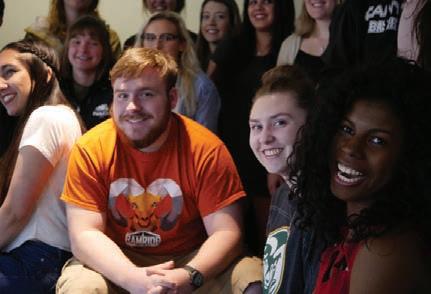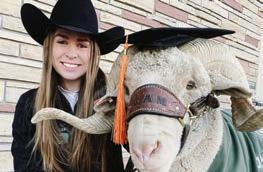A HELPFUL GUIDE FOR CSU PARENTS AND FAMILIES




With support from








With support from



Parent and Family Programs is the “main hub” where anybody that a student identifies as “family” or a “supporter” can contact to ask questions, get help with a problem their student is facing, or get coaching on how to have di erent kinds of conversations with their student.
How students define “family” is important to us, because family can include direct family members, distant family members, family friends, aunts, uncles, friend groups, grandparents, trusted religious figures, neighbors, and so many more. We believe that all forms of family are welcome at CSU, and we invite you to partner with us. Please call or email us.
970-491-6680 | parentfamilyprograms@colostate.edu

She/Her/Hers
Executive Director, Parent and Family Programs
Colette Sterling, M.S.
She/Her/Hers
Assistant Director, Parent and Family Programs

“Supporter: A person who is actively interested in, wishes success for, and encourages someone (a student), regardless of their relation to that person.”










FERPA is designed to protect the privacy rights of student educational records and to ensure the accuracy of those records.
FERPA applies to currently enrolled or formerly enrolled students (regardless of age or parental dependency status)

FERPA applies to all institutions that receive Department of Education funds
What this means for you is that you gain access to only specific kinds of information, but your student must allow it by inviting you into what we call FAMweb. For more information, as well as a question and answer section detailing how you can get access, scan the QR code. If you have questions about FAMweb or FERPA, please reach out to Parent and Family Programs as we are more than able to coach you on best practices around your student and their information.



We know that covering the cost of tuition and other expenses is top of the mind for families every semester, alongside thinking about financial aid. Before your student came to college, chances are that you had access to most information in middle school, high school, primary school, and elementary school. Coming to a college campus, that access becomes restricted due to FERPA.
During Ram Orientation, the team in Parent and Family Programs introduces new parents, families, and supporters to CSU’s Principles of Community (inclusion, respect, integrity, service, and social justice) because these principles shape how students engage with one another as part of the CSU community. This also applies to how our o ce works with you as a student’s family member/supporter to ensure we are all collaborating to make CSU’s community welcome, inclusive, and just.



















We create and nurture inclusive environments and welcome, value and a rm all members of our community, including their various identities, skills, ideas, talents and contributions.





We are accountable for our actions and will act ethically and honestly in all our interactions.


We honor the inherent dignity of all people within an environment where we are committed to freedom of expression, critical discourse, and the advancement of knowledge.


We are responsible, individually and collectively, to give of our time, talents, and resources to promote the well-being of each other and the development of our local, regional, and global communities.








We have the right to be treated and the responsibility to treat others with fairness and equity, the duty to challenge prejudice, and to uphold the laws, policies and procedures that promote justice in all respects.













• Unparalleled selection of CSU clothing, gifts and merchandise all under one roof, in one stop, convenientlylocated on campus.
• Unparalleled selection of CSU clothing, gifts and merchandise all under one roof, in one stop, convenientlylocated on campus.

• All the classroommaterials you need: notebooks, spirals, study aids, CSU imprinted supply products and hard-to-find specialty items.
• All the classroommaterials you need: notebooks, spirals, study aids, CSU imprinted supply products and hard-to-find specialty items.
• Art supplies and kits for CSU classes, or justfor fun!
• Art supplies and kits for CSU classes, or justfor fun!
• General interest reading bookseveryone needsa "good book break"from time totime.
• General interest reading bookseveryone needsa "good book break"from time totime.
• Buynow and pay later; use your student account and pay withyour tuition bill.Up to $1,200 books and supplies may be charged toyour account every semester.
• Buynow and pay later; use your student account and pay withyour tuition bill.Up to $1,200 books and supplies may be charged toyour account every semester.
Asthe Fatherof twoCSU graduates, Ican say that you have madea great choice, and that youare in for a great experience at CSU.Since Textbooks will be a large partofthe CSU experience, we put together a packettohelp, as my goal isto make theprocess as seamless as possible.
Asthe Fatherof twoCSU graduates, Ican say that you have madea great choice, and that youare in for a great experience at CSU.Since Textbooks will be a large partofthe CSU experience, we put together a packettohelp, as my goal isto make theprocess as seamless as possible.
• Competitively priced materials when compared to online retailers
• Competitively priced materials when compared to online retailers


• Buy now - pay later.Use your student account and pay with your tuition bill
• Buy now - pay later.Use your student account and pay with your tuition bill
• Correct book… guarantee
• Correct book… guarantee
• Save time and hassle, convenient on-campus loc
• Save time and hassle, convenient on-campus loc
• Used books, textbook rent anddigitalbooks
• Used books, textbook rent anddigitalbooks

• Shop online for in-store p or home delivery
• Shop online for in-store p or home delivery
JohnParry CSUBookstoreDirector FatherofTwoCSUGrads Ifyou’renot satisfiedletmeknowand Iwillmakesurewemakeitright. —John.Parry@colostate.edu

Ifyou’renot satisfiedletmeknowand Iwillmakesurewemakeitright. —John.Parry@colostate.edu





August is an exciting month filled with so many ways first-year, transfer, continuing and international students can get to know one another, get connected, and start the semester positively. As the semester continues, start talking about plans for you and your student to check-in. This could include texting regularly, having one or two phone calls a week, hosting a family Zoom session and more. Take time to talk about what will work for your family and your student.
Many students, both new and continuing, seek academic accommodations for their courses to aid them in being successful in class whether it is with homework, test taking, and/or having a learning aid (and more). Ask your student if they might need to meet with a specialist at the Student Disability Center (SDC) if they have a documented need for accommodations. The SDC’s calendar fills up quickly, so the sooner your student can see someone, the better.
Make sure your student is aware of the Housing and Dining Move-In Checklist, which covers everything you and your student need to prepare for moving into an on-campus residence hall or apartment.


the better.
Their phone number is 970-491-6385 and their email is sdc_csu@colostate.edu.
For first-year students, this time brings so much energy, and for continuing students, this is a great time to reflect on steps to take toward success (however your student defines that – it looks di erent for everyone). With all this excitement, nervousness, and energy, there is sometimes an assumption that everything has to happen all at once. For some students this might be true, and for many others it is not! The adjustment period for a student being at CSU varies widely, and Parent and Family Programs is here to help coach you through how to have those conversations!
All domestic and international students are required to submit health insurance preferences, health forms and immunizations before the semester begins. All CSU students have access to our wide range of medical, counseling and health education and prevention services, regardless of their insurance plan.
August 14-16th
Fall Move In and Ram Welcome for supporters, families, and parents.
August 15-20th
Fall Ram Welcome for first year, transfer, and international students

August 21st Classes begin August 21st Health Forms and Immunization Forms Due!
August 27th
Last day to add classes without override.
Welcome
Your student can get confidential advice from a campus attorney for no charge. Stu happens.

You’re not alone! Request an appointment at sls.colostate.edu

Legal counseling paid for by student fees. We’re here for you from orientation to graduation.
2023 AUG. 29 & 30
10 A.M.– 4 P.M.

Connect with 400+ student organizations and involvement opportunities! Think Big. Get Involved.
LSC PLAZA
For more information, visit ramlink.colostate.edu

Fort Collins is known for its friendliness and small-town warmth so take pride in where you live and get to know your neighbors and city ordinances. A simple “hello” goes a long way. This is your first step in building a good relationship, and it’s a great one, but don’t stop there. Grow the relationship throughout the yearyou never know when you will need a hand, Contact your neighbors in advance before undertaking something that may a ect them, like throwing a party, building a fence, or getting a dog. Be aware of not only local laws and HOA covenants but also neighborhood expectations. If your neighbor does something that bothers you, respectfully let them know. If you cannot work out a fair compromise, take advantage of free and confidential mediation services o ered by the City of Fort Collins Community Mediation Program, fcgov.com/mediation, (970) 224-6022.
Being at CSU means your student is now a part of a larger Ram Community where Rams Take Care, Rams Take Action. Now is the time to talk to your student about how they are centering mental health, physical health and wellness, and the overall wellness of others around them. CSU has lots of resources students can use to help themselves and other students. For first-year students, this means talking with their Resident Assistant (RA) in their residence hall, which is who to talk to if they are struggling or notice another student struggling.
One resource students at CSU can take advantage of is the Women Gender and Advocacy Center (WGAC). The WGAC provides confidential crisis intervention and emotional support as well as resources for survivors of sexual assault, relationship violence and stalking. Within the WGAC is the Victim Assistance Team (VAT), a 24 hours a day/7 days a week/ 365 days service that provides confidential advocacy service to CSU students in need of support. Victim Assistance Team can be contacted at (970) 492-4242.

The CSU Career Center provides excellent resources to CSU students. Some resources provided are but not limited to career exploration, resume and cover letter support, interview prep, grad school prep and so much more. For students looking to gather support from the Career Center, they can visit the center’s drop-in hours, schedule a one-on-one appointment, or utilize Handshake, which is an online platform that allows students to apply for internships and jobs. Students can also look forward to the Career Center’s semesterly career fairs.
One of the many new things your student gets to learn about (or continue gaining experience on) is financial success and wellness. For many first-year students, this could be their first time having to budget for life on campus. For o -campus and/ or continuing students, any time is a great time to refresh their financial know-how and awareness.

CSU EverFi is a financial wellness tool students can use to learn about managing their money while in school, as well as financial planning after graduation (yes, it will happen!).

September 15 - October 15
Latinx Heritage Month

September 4
Labor Day Holiday, Univerisity closed/ no classes.
September 6
Last day to add/drop courses.
Last day to submit health insurance requirement.















As the semester progresses, you might find your student struggling with their academics, whether that be understanding the material or learning how to balance their academics with other competing responsibilities. It is important to recognize that this is normal for many college students and that there are many resources available for them on campus.
The Institute for Learning and Teaching (TILT) provides tutoring services for various subjects including biology, chemistry, math, and physics as well as private tutoring options. To learn more about TILT’s services, go to tilt.colostate.edu/learning/tutoring.
Native American Cultural Center’s (NACC) Eagle Feather tutoring provides free in-person tutoring for various campus subjects such as biology, college composition, math, physics and more. All students are welcome to use this free service.
The Calculus and Writing Center provides academic support for students enrolled in calculus courses and/or who need support in their writing.

Every year, students are highly encouraged to apply for financial aid to help subsidize the cost of higher education. The Free Application for Federal Student Aid (FAFSA) is the federal government’s application to determine financial aid eligibility for most types of financial aid. FAFSA opens as early as Oct. 1 each year with the priority deadline to submit being the following March 1. Students who would qualify under ASSET (or cannot obtain U.S. citizenship) can apply for the Colorado Application for State Financial Aid (CAFSA).
The CSU Scholarship Application (CSUSA) is a competitive online scholarship application for many of the scholarships at CSU. Scholarships are available in all class levels (entering firstyear undergraduates, transfer, 2nd bachelor’s, graduate and Professional Veterinary Medicine.) The CSUSA includes both meritbased and financial need-based scholarships. To be considered for need-based scholarships through the CSUSA, your FAFSA must be submitted no later than March 1.
For many students who identify as neurodivergent and/or have a disability and/or learning di erence, seeking accommodations through the Student Disability Center is one of the first steps that we recommend. Another resource that o ers individualized support for students is called Opportunities for Postsecondary Success through the Center for Community Partnerships. The OPS works to help neurodivergent and/or students with disabilities become more organized, academically e ective, adjusted to life at CSU, and so much more. Talk with your student if they hold these experiences and are seeking help. More info
Now is a fantastic time to start talking about Fall Break (Nov. 18th -24th) housing plans for your first-year student. If your student is returning home, make sure they are preparing their room assignment for being gone over break. Explore how you and your student can plan a trip back home, or what support will look like if they choose to stay on campus over Fall Break.
October 13-15
Homecoming & Family Weekend

October marks so many noteworthy points for students. For first-year students, they have o cially made it half-way through their first semester (yay!). For those who love football, October includes CSU’s home game which also means celebrating Homecoming and Family Weekend. Homecoming and Family Weekend hosts popular events and traditions such as the Lighting of the A, the Bonfire, Festival on the Oval, and tailgates of all kinds. And, we know not all families can be present for these celebrations. Talk with your student about what traditions you all can start at home to mark their progress and celebrate their victories, no matter how big or small.



At the heart of campus for more than 60 years, the Lory Student Center is recognized as one of the nation’s foremost student centers. From the third level ballrooms with a spectacular view of the nearby Foothills to the Ramskeller pub and microbrewery (complete with a fermentation studies classroom), the awe-inspiring LSC Theatre, local and national food venues and several welcoming lounges, the LSC is a studentcentered student center.







Follow us on Instagram!




During this month, students will learn about their scheduled course registration times for the upcoming semester. Each student is provided with a time and day they can begin to register for their next semester courses which can be found on their RAMweb portal. When students log in to RAMweb, they will have to complete a few tasks to be registration ready and then they will be able to sign up for their courses. Prior to course registration, students need to meet with their academic advisor/Academic Success Coordinator for guidance on the courses they should take the upcoming semester.
November is a good time to chat with your student about how they are doing not just physically (i.e. getting enough sleep, eating enough, spending time both outside and inside), but also mentally. This could look lots of ways; it could be a check-in about grades or how your student is doing in courses, or if they have been spending time with their community of friends and supporters. If they are struggling, you can encourage them to connect with the CSU Health Network (health.colostate.edu).
The beginning of fall marks the beginning of flu season. During this time, we encourage you to have conversations with your students about getting their flu shot to protect them and others in the community. CSU students can receive their flu shots at the on-campus CSU Health Network by making an appointment. Flu shots are a covered benefit under most insurance plans.

Being on a college campus like CSU means that your student has met and will continue to meet so many incredible people whose life experiences are di erent than theirs. This can lead to growth and development within your student in ways that may be surprising if they come home for Fall Break. For example, if your student has not been around other people who look or identify as them (say if they are LGBTQIA+, or identify within a historically marginalized racial or ethnic group), this may bring up conversations that are di erent from what they experienced in K-12. CSU’s Student Diversity Programs and Services o ces (inclusiveexcellence.colostate.edu/studentdiversity-o ces) o er resources for students from many diverse populations, and Parent and Family Programs is happy to be a resource.

November 10
Last day to withdrawal, Repeat/Repair Deadline

November 18-24

Fall Break
November 27
Class resume





As your student is preparing for the end of the semester, now is a fantastic time to ask them their plans for either staying on campus in Fort Collins, coming home to visit family, or other plans. If they are coming home, check in about expectations for how they can be their best (well rested) selves. Ask them about what went well for the fall semester and what could change or improve, whether it was about classes, health and wellness, finding community, or shaping their career.
As your student approaches final exams, you may witness them experience heightened levels of stress as they begin to study and wrap up any final assignments. There are multiple ways that you can serve as a support to them during this time such as sending them encouraging messages, reminding them to take breaks, and adapting communication times/methods to fit the needs of their schedule. Additionally, remind them that there are resources available for them to use such as TILT, the Writing Center, Student Diversity Programs and Service, and more!
Take advantage of the winter break to consider summer plans


CSU o ers summer courses, with in-person, online, and hybrid courses o ered in condensed sub-terms, allowing students to get caught up or ahead on credits without taking up their whole summer. Summer courses can help students to fulfill an AUCC requirement or prerequisite before fall, check out a course for a minor, or Repeat/Repair a course to earn a better grade. Many experiential courses are o ered on the main campus, at the CSU Mountain Campus and other locations, including research, study abroad, and internships. The upcoming summer schedule will be available January 2, but in the meantime last summer’s courses can be viewed through the Courses at a Glance search tool for an idea of o erings. Go to summer.colostate.edu to learn more.

Rest is crucial. If your student is visiting home or taking time for themselves in Fort Collins, ask them if they have set aside time to do what brings them joy, whether it is hanging with friends or loved ones, going on vacation, or spending time with a hobby they love. This can help them feel more energized about the spring semester and more excited to envision what their upcoming semester can be like.

December 8

Last day of classes
December 11-15
Final exams


December 15-17
Commencement







In-person, hybrid, and online courses. Shorter and varying-length terms provide flexibility. Career-related experience: internships, research, and field courses.






Opportunity to graduate sooner and earn earlier.


Financial aid available for those who qualify.



Summer employment and prorated housing available.





























If your student struggled academically in the fall semester, now is a perfect time to talk about how your student can be more academically successful. The Institute for Learning and Teaching is a fantastic place for them to go for study skills, and be sure to ask them their plan for getting to know their instructors, attending o ce hours, and asking for help from classmates.
The summer schedule is now available in RAMweb and Courses at a Glance, where courses can be filtered by term within summer session, AUCC course, and delivery type (inperson or online). Courses will be added throughout spring semester. Registration begins in RAMweb March 19, 2024, the Tuesday after spring break. Students can discuss how summer courses fit with their academic plans with their advisor or Academic Support Coordinator (ASC). Explore the Summertime Savings and the Why Summer? web pages, including brief student videos/testimonials, and discuss how summer may benefit your student. Learn more at summer.colostate.edu.
The summer session 2024 schedule is available January 2nd!
With the changing seasons of spring also comes a quick semester. The transition between fall and spring can be a huge shift for students, as the spring semester can feel like it is picking up very fast. Students can become disconnected as summer approaches, so ask your student their plan for keeping the fall energy and momentum going for spring. This could look like getting involved through SLiCE or finding spring events to attend through the CSU events calendar.
Early January
Spring Ram Welcome

January 15
University Holiday, University closed/no classes
January 16
Classes begin
January 21
Last day to add without override
Last day to add/drop courses

January 31
Last day to submit health insurance requirement for Spring 2024


Beginning this month Tax Form 1098-T becomes available on FAMweb. To view or print your form log in to FAMweb, go to Billing and Tax Information --> Tax Information --> 1098-T Reporting Form. Your students will also have access to this form through their RAMweb following the same instructions above.


The Student Resolution Center provides students with conflict resolution and student conduct services. Conflict resolutions services are voluntary, neutral, confidential support for students navigating disputes, procedural challenges, and interpersonal conflict. Student conduct services are one-onone meetings to discuss alleged violation of the Student Conduct Code. Hearing o cers listen to student perspectives, determine responsibility, ensure accountability, and provide educational and restorative outcomes when appropriate.
Black History Month begins February 1st
For many first-year students, now is about the time where they start thinking about what living o campus could look like. This could also be the case for many continuing students or current students who are just looking for somewhere else to move. Talk to your student about O -Campus Life’s Student Handbook. If your student would like to continue living on campus, there are plenty of options available. Have them check out housing.colostate.edu.



Summer Session 2024 registration opens March 19th
Registration begins the Tuesday after spring break. More classes may be added throughout the spring. Students can stay in on-campus housing during the weeks they have class, paying only for the time needed, and explore student employment opportunities on- and o -campus through the Career Center. Summer-specific Learning Resources are available to help them succeed. All this and more can be found on the CSU Summer website. Learn more at summer.colostate.edu and career.colostate.edu.




With summer approaching, now is a fantastic time to start talking to your student about what they plan to do about summer, which might involve finding a job or internship. Outside of the extensive events and programs CSU’s Career Center o ers to students, they also o er one-onone appointments and many online resources for students. These resources include Handshake, which is the online portal CSU utilizes for employment opportunities inside and outside of campus. Share these with your student and have them reach out.
March 9-18
Spring Break (No classes)
March 19
Summer registration opens

Did you know that around one-third of students on a college campus end up changing their major at least once through their educational careers? No matter what year your student is, it’s always worth having a conversation about how they feel about their major. Some questions you can ask include the following: What do they like about it? What brings them joy about their major? Do they know anyone in the career field they want to go into who has their major? Could they see themselves working in this career field after they graduate? Major changes are an expected part of the student experience, and if your student is interested, have them talk with their academic advisor about all the implications of changing their major.


At Colorado State University, we explicitly recognize that to sustain human life and well-being for the future we must accept the interconnectedness of planetary and human health. And we a rm that sustainable solutions must be interdisciplinary, ecologically sound, socially just, and economically viable. CSU is a nationally recognized sustainability leader. To learn more about sustainability-related research, engagement, and majors, minors and courses go to green.colostate.edu.
Depending on the student you support, “coming home” for the summer will look very di erent. If your student has been on campus for a time, now would be a great point to talk about any family vacations, summer traditions, or ways your student can get support and care while they remain in Fort Collins. If your student is getting ready to end their first year on campus, it’s possible they might have gotten used to an independence they might not have had previously. If they plan to stay with you for the summer, talk about the boundaries both of you have while they are home.
April 12
Last day to withdraw, Repeat/Repair Deadline
April 18
I Love CSU Day

April 22
Earth Day
May 3
Last day of classes
May 6-10
Final exams
May 10-12
Commencement
May 13
4-, 8-, and 12-week Summer Terms begin
For those of you who have students who are graduating, now is the time to get ready to celebrate their massive accomplishment. Whether you can come to their graduation ceremony or not, there are plenty of ways your student can be celebrated at home and on campus. Make sure they are checking their commencement emails for up to date information on their specific ceremonies.
For non-graduating students, getting to the end of their academic year is still an achievement worth celebrating too. Ask your student how they might want to be celebrated, and work with them to come up with some plans to o er closure to their year at CSU.


If your student is mentioning that they are feeling more disconnected than they might have their first semester (or previous semesters), the summer o ers time to talk about what it will look like for them to get re-engaged at CSU. We often find that the more students are connecting into involvement opportunities on campus through the SLiCE (Student Leadership Involvement and Community Engagement) o ce and seeking out opportunities in their academic departments, the easier it can be to find a new group of friends and community. Let them know it can take time to find people to connect with, and that if they stick to their values and their interests (whether academic, social, or careerbased), they will find connections with others.
A myth about college life that tends to get perpetuated is that the first year a student is on campus, whether they are first-year, transfer, adult learner, or international students, is that they’ve likely found all the help they need and a parent, family member, or supporter can finally step back. While this can be true for some students, the transition into college can remain consistent throughout a student’s entire time on campus. For example, entire friend groups could change during their third year, or a major change in their second year means that the plans a student might have had about the future suddenly changes. Identity development, especially for marginalized students, continues to remain a huge part of who they are long after they graduate. Take this time to ask your student, “What does support look like from us as your family for this next year?”

June 1st
LGBTQIA+ Pride Month begins

June 9
First 4-week Summer Term ends
June 10
2nd 4- and 8-week Summer Terms begin
While a lot of the work we do at Parent and Family Programs is focused on that initial transition your family and student(s) have their first year on campus, we do a lot of work with families beyond that. We aren’t just here in times of crises, but also in times of celebration or curiosity. When we say that we coach, refer, and explain, it applies to the entire time you and your students are a part of the CSU Community.
If you have not signed up yet, our CampusESP portal is a fantastic tool that will help you understand what each year on campus looks like, has a ton of valuable information, and shares how you can continue to engage with us. See page 8 for more information.